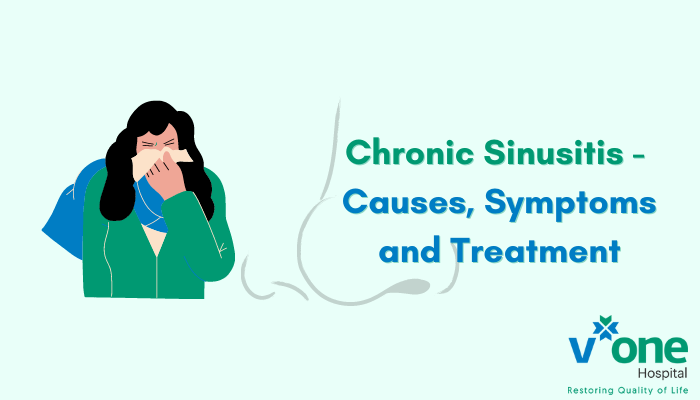Chronic Sinusitis | Know About it from Top ENT Specialist
Your sinuses are the four paired cavities (spaces) connected by narrow channels inside your head. They make thin mucus that then makes its way down your nose and drains out. They keep your nose clean and free of bacteria.
When the sinuses are swollen and inflamed and the infection lasts for over 3 months despite treatment, it may indicate chronic sinusitis. The sinuses become infected and blocked with fluid, making it harder to breathe.
Acute sinusitis may go away on its own in up to 4 weeks, but chronic sinusitis lingers for much longer, possibly with symptom-free periods in between.
Common Causes of Chronic Sinusitis
A lot of things can cause chronic sinusitis:
1. Nasal Polyps
These soft, noncancerous growths on your nasal or sinus linings can block the nasal passages.
2. Deviated Septum
A crooked septum (the wall between your nostrils) can also block the sinus.
3. Infections
Bacterial, viral, or fungal infections can inflame and thicken the sinus membranes, effectively blocking them and stopping mucus drainage.
4. Allergies & Medical Conditions
Blocked airways from asthma, allergies, or conditions like cystic fibrosis, HIV, or other immune diseases.
5. A weak immune system
Symptoms of Chronic Sinusitis
With chronic sinusitis, people most commonly experience:
- Nasal inflammation
- Tenderness, pressure, pain, and swelling around the nose, eyes, and forehead
- Runny nose with thick, yellow, or green discharge
- Post-nasal drip, which is when mucus drips down the throat
- Cough
- Reduced sense of taste and smell
Other than these symptoms, people may also experience:
- Bad breath
- Fatigue
- Ear pain
- Headache
- Toothache
- Sore throat or throat clearing
How is Chronic Sinusitis Diagnosed?
So how do you know if you have chronic sinusitis? If it has been over 12 weeks and your symptoms haven’t cleared, it’s time to see a doctor. Your doctor will probably check for sinusitis in one of these ways:
- Using a thin, flexible endoscope to see inside your nose and sinuses using fiber-optic light
- Carrying out a CT Scan or an MRI to look for structural issues, like polyps, tumors, fungi, or a deviated septum that is difficult to see with an endoscope
- By ordering an allergy skin test to understand whether an allergen is triggering the nasal flare-ups
- Rarely, by taking a swab to your nose to collect cultures and ordering a biopsy to analyze the tissue or bone samples under the microscope in order to determine if the infection has spread (this may be useful if nothing else works or if the condition is worsening)
Treatment Options: How is Chronic Sinusitis Treated?
Sometimes, this condition never fully goes away, and there’s no guarantee that any treatment will be able to provide 100% relief, but you do have a few ongoing treatment options available to help manage the symptoms, that can sometimes permanently cure the condition.
1. Nasal Corticosteroids
You can use these nasal sprays to prevent and treat inflammation, or you can use a solution or a mist of the solution of saline and budesonide. Additionally, you can use leukotriene antagonists.
2. Antifungal Medication
You can take antifungal medication or treatment if fungi are the cause of your infection.
3. Saline Nasal Irrigation
As mentioned previously, using nasal sprays and solutions can minimize drainage and rinse away the irritants.
4. Oral or Injected Corticosteroids
If you also have nasal polyps or have been dealing with severe symptoms of sinusitis, your doctor might prescribe oral corticosteroids. These do the same thing – relieve inflammation, but they can cause serious side effects if used for a long time.
5. Avoiding Triggers
A big part of the treatment is for you to avoid your triggers if the cause for you is allergies.
6. Allergy Medications
Or you may take medicines to appease your allergy symptoms – for example, you may start taking them 2-4 weeks before your allergy season begins.
7. Treating Allergies or Conditions
Whether it’s allergies, asthma, or certain immune deficiency conditions, you need to treat it using medicines or sprays.
8. Aspirin Desensitization Treatment
If aspirin is the cause of your sinusitis or polyps, your doctor will prescribe larger doses of aspirin to increase your tolerance to it.
9. Antibiotics
If your sinusitis has been caused by bacteria, your doctor might prescribe a course of antibiotics.
10. Immunotherapy
If allergies are behind your condition, allergy shots can reduce your body’s reaction to it.
11. Medication
Taking in injections like dupilumab or omalizumab can make the nasal polyps smaller and decrease congestion.
12. Surgery
If medication or other treatment doesn’t work, surgery may be an option for you. After using an endoscope to look into the sinuses, your doctor may remove tissue from a blocking nasal polyp using instruments, or by expanding a narrow sinus. Surgery can also help correct a deviated septum.
Along with these treatments, other things that help are rest, warm compresses, moisturizing the sinuses by inhaling vapor from a bowl, and rinsing out the nasal passages with a saline bottle or a neti pot.

